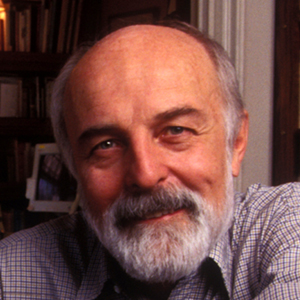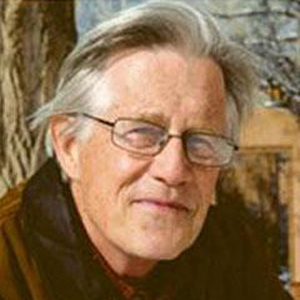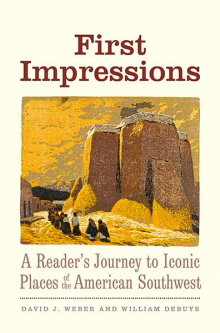First Impressions, Lasting Impact
Literary Partnership Brings an Unfinished Journey to Completion
By Patricia LaSalle-Hopkins
Contributor
When SMU historian David J. Weber died in 2010, he left behind an unfinished manuscript that would have represented a creative departure from his many academic works. One of the most distinguished and productive scholars of the American Southwest, Weber envisioned his next book, First Impressions: A Reader’s Journey to Iconic Places of the Southwest, as a new perspective on some of the Southwest’s most distinctive sites.
 David Weber |
 William deBuys |
More than a typical travelogue, the book would bring the reader into the minds of explorers, missionaries, and travelers as they encountered and then wrote about memorable places both manmade and naturally formed, becoming the first non-natives to do so. From impressions of 15 sites in Arizona, New Mexico, southern Utah and southern Colorado, readers would gain present-day as well as historical perspectives. The destinations would range from the gracefully sculpted rock formations of Canyon de Chelly, to the mesa fortress of Acoma Pueblo, to the conflict-ridden village of Santa Fe, described by an 18th century Franciscan as, “A rough stone set in fine metal,” referring to, “The very beautiful plain on which it sits.”
But first the journey of the unfinished manuscript would have to continue. David’s widow, Carol Weber, who had served consistently as the final reviewer of all of David’s manuscripts, knew that this project deserved a place in her husband’s legacy of eloquent and inspired scholarship. As she considered who might complete the manuscript, Carol turned to their friend, author William deBuys. Like David, Bill had received a shower of honors for his creative and scholarly works. In addition, Bill had earned the distinction of being a fellow of the Clements Center for Southwest Studies, founded in 1996 by David at Southern Methodist University, where he taught for 34 years.
Over a number of these years, David and Bill grew in admiration of each other’s work. David had revolutionized contemporary understanding of borderlands history. Bill had earned a national reputation for his analyses of environmental issues threatening the Southwest. They also grew as friends sharing a deep affection for the region, its people and places. “For both of us, the Southwest has been a source of lifelong fascination, and through the vehicle of this book we hope to share it,” Bill writes in the preface of, First Impressions, published by Yale University Press in August.
The production of First Impressions required some highly focused sleuthing and sifting through a bounty of materials in the three offices of David Weber – in SMU’s History Department and at the family’s homes in Dallas and in New Mexico’s Zuni Mountains, near the monumental El Morro, or Inscription Rock, so called because it bears the signatures of early explorers etched into its sandstone façade. Each of David’s offices was filled to capacity with books, research notes, correspondence, manuscripts, drafts, and computers holding the contents of David’s prolific research and writing. Carol found a hard copy of David’s table of contents and a number of chapters in different states of completion. She and Bill worked with Center for Southwest Studies staff, especially Ruth Ann Elmore, to download and decipher David’s computer files.
The Center had awarded Bill a second fellowship to work on the project.
“I chose Bill because I knew he was a sensitive and wonderful writer, and David felt the same way about him,” Carol said. “I couldn't imagine any other historian finishing David's work in a way that would have pleased David because it would be so beautifully written.”

Aside from representing his admiration for David, Bill said he took on the project because he, “Thought the concept of the book was brilliant and offered a truly exciting and informative way to explore the great places of the region. David, ever the professor, had a wonderful pedagogical purpose: He wanted to present primary sources — original historical documents and images — to people who otherwise might be unlikely to encounter them. In this I completely concurred. It is a form of stealth teaching — and wonderful fun at the same time.”
The result of their literary partnership is a book that seamlessly combines the poetry and precision of both writers. Bill’s numerous books include River of Traps: A New Mexico Mountain Life, a finalist for the nonfiction Pulitzer Prize in 1991; Enchantment and Exploitation: The Life and Hard Times of a New Mexico Mountain Range; A Great Aridness: Climate Change and the Future of the American Southwest; and The Last Unicorn: A Search for One of the Earth’s Rarest Creatures. In September 2017 he is receiving the New Mexico Governor’s Award for Excellence in the Arts, for outstanding writing and literature.
David’s works include 27 books, many of them recognized as path-breaking in the field by such organizations as the American Historical Association. The Mexican Frontier, 1821-1846: The American Southwest Under Mexico itself won six awards. Two governments gave David the highest honor they can bestow on foreigners. King Juan Carlos of Spain named him to the Real Orden de Isabel la Católica, the Spanish equivalent of a knighthood. Mexico named him to the Orden Mexicana del Águila Azteca (the Order of the Aztec Eagle). He was one of a few U.S. historians elected to the Mexican Academy of History. Closer to home, in 2007 he was inducted into the American Academy of Arts and Sciences.
Upon release of First Impressions, Carol told Bill: “It was my love for David that prompted me to ask you if you would finish the book, and it was such an act of love for David, I think, that you willingly took so much time out of your life to finish it for David and our family. Somehow David's life now seems complete.”
Complete – but not finished. Now, First Impressions, with William deBuys, adds to the lasting legacy of David J. Weber and the rich literary resources of their beloved Southwest.